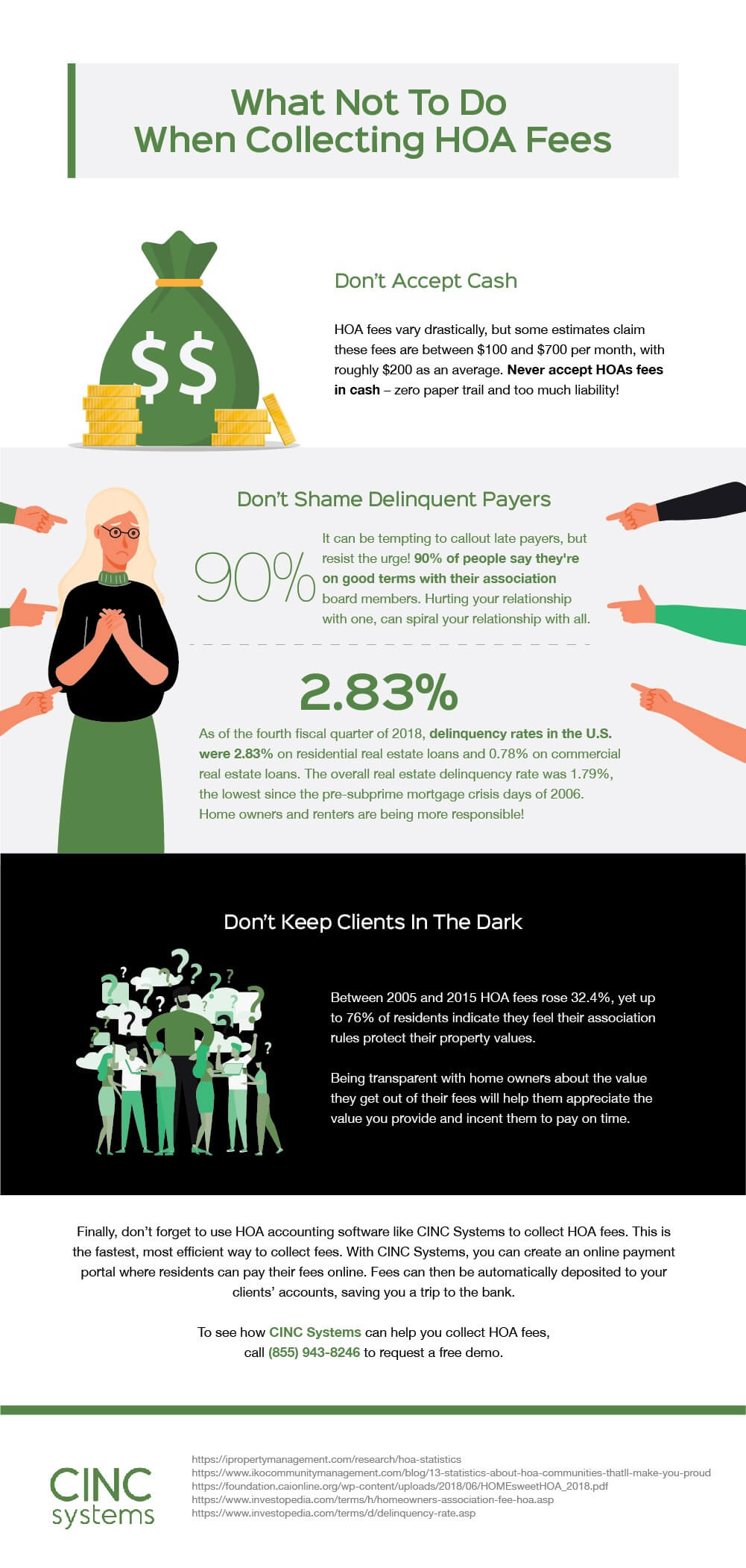- September 20, 2019
- CINC Systems

When you manage a homeowner association (HOA), collecting fees is an important part of your job. The fees paid by residents to pay the bills and help to create a reserve fund for the HOA, which allows the association to pay for the community’s upkeep, renovations, and amenities. Established by the HOA’s board members, association fees may be collected annually, quarterly or monthly; there may be special assessments from time to time.

When it’s time for you to collect HOA fees for your clients, there are several “Do’s” and “Don’ts” you should follow to ensure a successful transaction. In many ways, the best policies for collecting HOA fees are very similar to the Dos and Don’ts of collecting rent for landlords. Use common sense and practice good customer service skills. By understanding what not to do when collecting HOA fees, you can provide superior service to your association management clients.
Collect HOA fees on time, every time, by following these important association management guidelines.
Don’t Accept Cash
First, don’t accept HOA fee payments in cash. There are several reasons why cash isn’t a good payment option for fees. For one thing, carrying lots of cash or even temporarily storing it in an office safe isn’t very secure. The fees you collect belong to your clients, so you don’t want to risk losing any of the residents’ money — you may even be held liable if the numbers don’t add up.
Also, cash transactions don’t provide a paper trail. Although you could theoretically give the resident a receipt, cash transactions are still too complicated. You would need to deposit the money in the association’s account at the bank, then manually record the resident’s payment in your HOA management software. It’s inefficient and time-consuming.
When you collect association fees for your clients, impose a strict “no cash” policy. Ask for checks, money orders, or credit card payments instead.
Don’t Give Residents Your Home Address
As a professional association manager, you should keep your business life and your personal life separate. Never give your clients’ residents your home address for any reason. If residents send their association fees to your home, it could lead to many problems for you and your client.
As with cash transactions, HOA fees sent to your home could potentially become lost. Additionally, giving residents your home address opens the door for potential conflict should disputes arise. Although you should develop a friendly rapport with the residents of the HOAs you manage, it’s important to maintain a boundary so they don’t bother you after-hours.
Don’t Use an Unsecure Collection Box
When you collect HOA fees from residents, use a secure collection method. If this is a collection box on-site in a manager’s office or community mailroom, make sure the box has a solid lock — and ensure that you’re the only one with the key. Choose a box with a small insert space, designed to prevent anyone from reaching inside.
Don’t Go Door-to-Door
Don’t collect fees door-to-door. When considering what not to do when collecting HOA fees, it may help to put yourself in a resident’s shoes. Would you want the HOA manager of your neighborhood knocking on your door to collect fees? Probably not. As an association manager, you shouldn’t disturb your clients’ residents when you don’t have to, especially to collect fees.
In addition to being disruptive, collecting fees door-to-door is also very inefficient. Your clients’ association may have dozens or even hundreds of residents, so collecting in person would take too much time. Even if you’re managing a small HOA with a limited number of residents, there’s still no way to guarantee that everyone will be home when you drop by.
Don’t Keep Charge Account Numbers on File without Explicit Permission
With online accounting software for HOAs, you’ll be processing a lot of financial transactions for your clients. In certain cases, your accounting software may include a “point of sale” feature that stores credit card information on file. If this is the case for any of the HOAs you manage, make sure that the resident’s credit card won’t be charged automatically when it’s time to pay annual fees. This could be misinterpreted as fraud and create problems for your client.
However, using your HOA accounting software, you may have an option to allow residents to set up automatic payments via an online payment portal. If this is the case, make sure that they fill out the proper legal agreement to opt-in for automatic deductions.
Don’t Publicly Shame Late Payers
Inevitably, sooner or later you’ll encounter a resident who hasn’t paid their HOA fees on time. When this occurs, don’t publicly shame them by posting their name on a board, or otherwise sharing their late payment status with the community. Even if the delinquent resident is a repeat offender, public shaming won’t work — and it may even be a violation of their privacy rights. Don’t do it.
Don’t Keep Your Clients in the Dark
As an HOA manager, part of your job is handling all the day-to-day operations of the association so your clients don’t have to. HOA board members have busy lives, with most working full-time jobs in addition to their role on the board. Whenever possible, perform your job duties without bothering them with unimportant details.
However, don’t keep them in the dark when it comes to financial matters such as resident fees. It’s important to be transparent and maintain your clients’ trust. As you begin the process of collecting resident fees, communicate with your clients about your progress. You can also use your association accounting software to generate financial reports to share via email.
Don’t Forget Your HOA Accounting Software
Finally, don’t forget to use HOA accounting software like CINC Systems to collect HOA fees. This is the fastest, most efficient way to collect fees. With CINC Systems, you can create an online payment portal where residents can pay their fees online. Fees can then be automatically deposited to your clients’ accounts, saving you a trip to the bank.
To see how CINC Systems can help you collect HOA fees, call (855) 943-8246 to request a free demo.
Related Reads

Blog
Unlocking Manager Potential: How Cephai in CINC Manager Frees Up Time for Engagement
- November 22, 2024

Blog
Keeping Calm and Carrying On: Leadership Tips for Turbulent Times
- November 20, 2024

Blog
AI at Bat: What Umpires, Baseball, and Data Security Can Teach Us About AI Risks
- October 28, 2024

Blog
Do I really need a homeowner app when I have a mobile-friendly website?
- October 14, 2024

Blog
Weathering the Storm: How to Adapt to Soaring HOA Insurance Costs
- October 1, 2024

Blog
How Today’s Generative AI Investment Drives Long-Term CAM Success: A Timeline
- September 16, 2024
